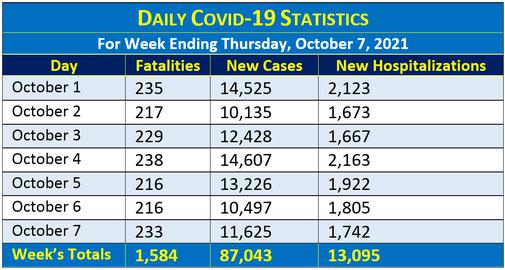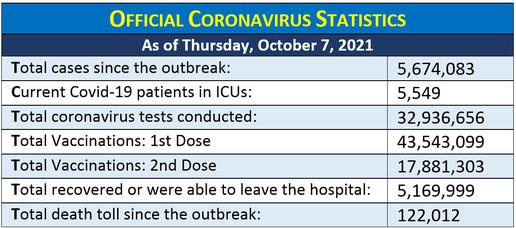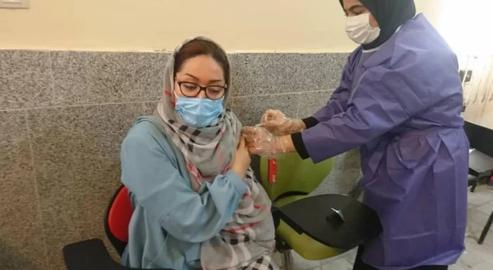Amid an ongoing tsunami of anti-vaccine content on Persian-language social media, vaccine hesitancy is a growing problem in Iran. The latest poll by the Iranian Student Polling Agency (ISPA), over 14 percent of Iranian men and women do not believe in vaccination against Covid-19.
With some irony, a considerable proportion of the anti-vaxxine propaganda of the past two years has been disseminated by Iranian media outlets close to the regime. This has made it much more difficult to convince vaccine doubters of the necessity of the jabs. A new, manufactured controversy around vaccines and pregnant women has not made the situation any easier, either.
Like many other coronavirus-related events in Iran, the issue of importing vaccines for pregnant women became entangled with directives issued by the Supreme Leader. In January 2021, Ayatollah Khamenei banned the importation of Covid-19 vaccines from the US and the UK. Many have attributed the jump in fatalities – to over 700 a day officially – during the fourth and fifth waves in Iran to this misguided decision.
After Ebrahim Raisi took over the presidency, the Supreme Leader performed a sort of volte face by clarifying that the ban applied to vaccines “made” in the US and the UK – and that if they were made in another country they could be imported.
On September 23, the Ministry of Health then announced that it was planning to import 2.4 million doses of Pfizer vaccine from Belgium specifically to inoculate pregnant women. But Fars News Agency, which is affiliated with the Revolutionary Guards, strongly criticized the decision: “Why must our pregnant women be injected with the Pfizer vaccine? Has this vaccine been tested on pregnant women and future mothers in other countries, or is Iran one of the first where future mothers are put in harm’s way?” Earlier Fars had also supported public protests by Iranian anti-vaxxers.
In the end, the Health Ministry gave in under pressure and announced that the National Coronavirus Taskforce had come to the conclusion that the vaccination of pregnant women should continue with the Sinopharm vaccine – even though the World Health Organization (WHO) has only approved Pfizer and Moderna for expecting mothers. There were also plans to import five million doses of Johnson and Johnson, but this was canceled as well.
This, of course, is not the first or the last time that politics has interfered with public health in Iran. But the resulting controversy has made even more families wary of vaccination.
Should Pregnant Women Be Vaccinated?
A gynaecologist in Iran, who asked to be known as Nargess, told IranWire pregnant women must get their Covid-19 jab when offered. Coronavirus makes no exception for those who are expecting, she said, and in fact: “It’s even more necessary for pregnant women to get vaccinated, because pregnancy leads to changes in the body that makes women more vulnerable to the virus.
“I came across a case at Al Zahra Hospital in Rasht; the mother was infected with coronavirus and the foetus had a stroke. In another case, a young mother was hospitalized with Covid-19 and went into a coma; the foetus died, as did she herself a few days later. I can’t put it more clearly than this. Get vaccinated.”
Pregnant women, according to Nargess, are up to three times more likely to need to be hospitalized in an ICU or put on a ventilator if they contract Covid-19. It also puts the unborn baby at significant risk.
But is Sinopharm – the government’s new product of choice to vaccinate pregnant women – safe and effective? “What takes priority is the vaccination of pregnant women, regardless of the vaccine’s brand,” Nargess said. “We do know that there are better vaccines out there than Sinopharm. But make no mistake: Sinopharm is still a very good vaccine.”
She urged pregnant women not to wait for a given brand of vaccine, and to accept a vaccine when offered despite their condition: “A pregnant woman might suffer from high blood pressure, thyroid problems, and so on – but none of these preclude vaccination. And Sinopharm is a good choice for pregnant women, because it generates fewer complications. For example, it’s less likely to lead to fever.”
When Is Vaccination Dangerous for Pregnant Women?
Pregnancy generally lasts for fewer than 40 weeks. According to Nargess, the best time to get a vaccine is after the 12th week of pregnancy and before the 38th week: “The medical center’s personnel will tell the expecting mother whether it is the right time for vaccination or not. But the main reason [that this is the best time-frame] is that during early weeks, the embryo’s organs are still just growing and taking shape. Also, women who have given birth or had an abortion ought to wait for at least 10 days before getting vaccinated.”
That said, women can still get vaccinated in the very early weeks of pregnancy; many will do, because of not yet being aware that they are pregnant. “According to the Ministry of Health guidelines, if a woman receives the first dose and then finds out that she is pregnant, she must hold off getting the second,” Nargess said. “After the 12th week is over, if the first dose hasn’t been Sinopharm, she must give her consent in writing to receive the second dose of the same one. Otherwise, regardless of the brand of the first vaccine, she can start all over again and receive two doses of Sinopharm with the necessary interval between them.”
Women are typically inoculated against tetanus, diptheria and sometimes flu in the 28th week of pregnancy. These vaccines don’t interfere with the efficacy of others like the Covid-19 jab, Nargess says, but it is still better to space them out – ideally by around two weeks.
The new 4030 Call System has been set up in Iran for people to consult with health experts about Covid-19. By dialling 4, pregnant women can talk to a specialist with any questions about the vaccine.
Official Coronavirus Statistics
According to the Health Ministry’s weekly statistics, a total of 1,584 patients are known to have lost their lives to Covid-19 in the week ending October 7. With 238 deaths, October 4 had the highest officially-recorded number of fatalities for the week.

At the week’s end, 5,549 Covid-19 patients in Iran were being treated in ICUs. According to the Health Ministry, at the time of writing the total number of vaccine doses injected, both first and second shots, had reached 61,424,402.

There are currently 16 Iranian cities on red alert for coronavirus transmission. Another 198 are rated orange and 176 are yellow. Currently 58 cities in Iran are on “blue” alert.
Related coverage:
Coronavirus Pandemic: An Iranian Chronology, September 202
Coronavirus Taskforce: People Who Refuse a Covid-19 Vaccine Will Face Heavy Fines
Real Number of Children Who Lost Parents to Coronavirus is Three Times the Official Figure
With Covid-19 Still Raging, Iran Switches to Vaccinating Children
Iranian Anti-Vaxxer Protests Dismissed as Over-18s Inoculations Begin
Anti-Vaxxers Invoke Ghasem Soleimani at Tehran Protest
Hospitals Scramble to Cope with Nursing Shortages as New Variant Threatens Iran
Death Toll Worst Among Iran’s Middle-Aged Coronavirus Patients
visit the accountability section
In this section of Iran Wire, you can contact the officials and launch your campaign for various problems


























comments